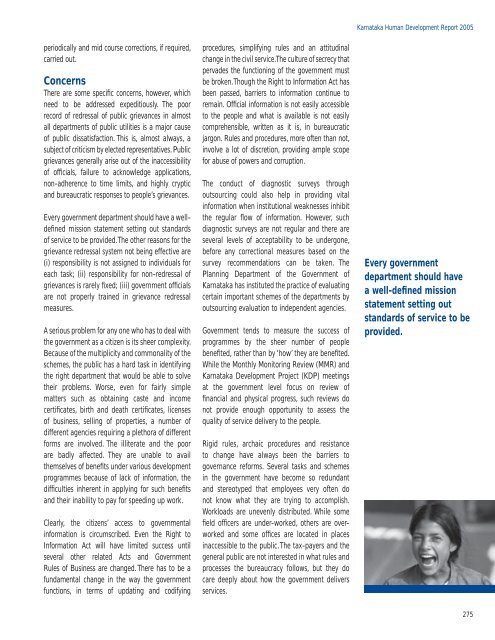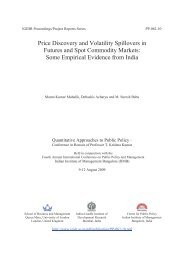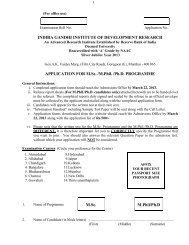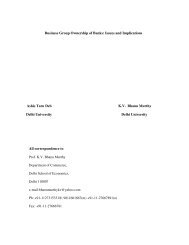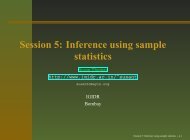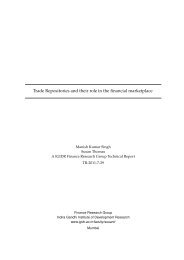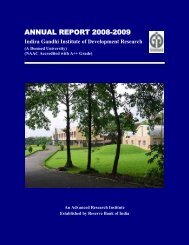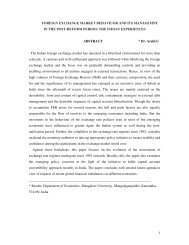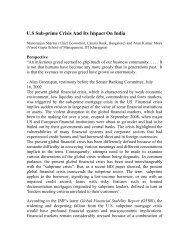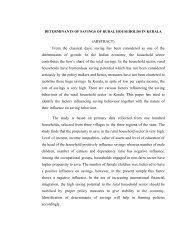- Page 1 and 2:
KARNATAKA HUMAN DEVELOPMENT REPORT
- Page 3 and 4:
© Copyright 2006Government of Karn
- Page 5 and 6:
MessageIt is indeed appropriate tha
- Page 7 and 8:
9. Dr. Malati DasChief Secretary,Go
- Page 9 and 10:
AcknowledgementsThe preparation of
- Page 11 and 12:
AcknowledgementsK. Shankar Rao, Sen
- Page 13 and 14:
List of ParticipantsRegional Worksh
- Page 15 and 16:
List of ParticipantsManasagangothri
- Page 17 and 18:
ContentsAbbreviationsIntroductionCH
- Page 19 and 20:
Box 5.2 Monitorable targets in the
- Page 21 and 22:
Table 4.5 Estimates of Net District
- Page 23 and 24:
Table 8.7 Agricultural wages of rur
- Page 25 and 26:
AbbreviationsABER : Annual Blood Ex
- Page 27 and 28:
AbbreviationsINS : Indian Naval Ser
- Page 29 and 30:
AbbreviationsSDP : State Domestic P
- Page 31 and 32:
Introductionprimarily on public spe
- Page 33 and 34:
Karnataka: An Overview
- Page 35 and 36:
CHAPTER 1Karnataka Human Developmen
- Page 37 and 38:
Karnataka Human Development Report
- Page 39 and 40:
Karnataka Human Development Report
- Page 41 and 42:
Human Development in Karnataka
- Page 43 and 44:
CHAPTER 2Karnataka Human Developmen
- Page 45 and 46:
Karnataka Human Development Report
- Page 47 and 48:
Karnataka Human Development Report
- Page 49 and 50:
Karnataka Human Development Report
- Page 51 and 52:
Karnataka Human Development Report
- Page 53 and 54:
Karnataka Human Development Report
- Page 55 and 56:
Karnataka Human Development Report
- Page 57 and 58:
Karnataka Human Development Report
- Page 59 and 60:
Karnataka Human Development Report
- Page 61 and 62:
Karnataka Human Development Report
- Page 63 and 64:
CHAPTER 3Karnataka Human Developmen
- Page 65 and 66:
Karnataka Human Development Report
- Page 67 and 68:
Karnataka Human Development Report
- Page 69 and 70:
Karnataka Human Development Report
- Page 71 and 72:
Karnataka Human Development Report
- Page 73 and 74:
Karnataka Human Development Report
- Page 75 and 76:
Karnataka Human Development Report
- Page 77 and 78:
Karnataka Human Development Report
- Page 79 and 80:
Karnataka Human Development Report
- Page 81 and 82:
Karnataka Human Development Report
- Page 83 and 84:
Karnataka Human Development Report
- Page 85 and 86:
Karnataka Human Development Report
- Page 87 and 88:
Karnataka Human Development Report
- Page 89 and 90:
Karnataka Human Development Report
- Page 91 and 92:
Karnataka Human Development Report
- Page 93 and 94:
Karnataka Human Development Report
- Page 95 and 96:
Karnataka Human Development Report
- Page 97 and 98:
Karnataka Human Development Report
- Page 99 and 100:
Karnataka Human Development Report
- Page 101 and 102:
Karnataka Human Development Report
- Page 103 and 104:
Income, Employment and Poverty
- Page 105 and 106:
CHAPTER 4Income, Employment and Pov
- Page 107 and 108:
HouseholdtypeKarnataka Human Develo
- Page 109 and 110:
Karnataka Human Development Report
- Page 111 and 112:
TABLE 4.7Agricultural wages for men
- Page 113 and 114:
Karnataka Human Development Report
- Page 115 and 116:
Karnataka Human Development Report
- Page 117 and 118:
2.64 per cent per annum) and to 23.
- Page 119 and 120:
Karnataka Human Development Report
- Page 121 and 122:
Karnataka Human Development Report
- Page 123 and 124:
ConcernsComparable with all-India t
- Page 125:
Literacy and Education
- Page 128 and 129:
Literacy and Educationdo not have t
- Page 130 and 131:
Literacy and EducationTABLE 5.2Lite
- Page 132 and 133:
Literacy and EducationThe lowest ge
- Page 134 and 135:
Literacy and EducationBOX 5.4Object
- Page 136 and 137:
Literacy and EducationBOX 5.6Involv
- Page 138 and 139:
Literacy and Education% of girls’
- Page 140 and 141:
Literacy and EducationBOX 5.9How to
- Page 142 and 143:
Literacy and EducationGirls’ educ
- Page 144 and 145:
Literacy and EducationGiven the dom
- Page 146 and 147:
Literacy and EducationThe enrolment
- Page 149 and 150:
Karnataka Human Development Report
- Page 153 and 154:
Karnataka Human Development Report
- Page 155 and 156:
- ‘hard’ factors such as infras
- Page 158 and 159:
CHAPTER 6Demography, Health and Nut
- Page 160 and 161:
Karnataka Human Development Report
- Page 162 and 163:
Karnataka Human Development Report
- Page 164 and 165:
Karnataka Human Development Report
- Page 166 and 167:
Karnataka Human Development Report
- Page 168 and 169:
Karnataka Human Development Report
- Page 170 and 171:
Karnataka Human Development Report
- Page 172 and 173:
Karnataka Human Development Report
- Page 174 and 175:
Karnataka Human Development Report
- Page 176 and 177:
Karnataka Human Development Report
- Page 178 and 179:
Karnataka Human Development Report
- Page 180 and 181:
Karnataka Human Development Report
- Page 183 and 184:
CHAPTER 7Housing, Water Supply and
- Page 185 and 186:
Karnataka Human Development Report
- Page 187 and 188:
TABLE 7.2Houses constructed under S
- Page 189 and 190:
Karnataka Human Development Report
- Page 191 and 192:
Karnataka Human Development Report
- Page 193 and 194:
Karnataka Human Development Report
- Page 195 and 196:
Karnataka Human Development Report
- Page 197:
Gender and Human Development
- Page 200 and 201:
Gender and Human DevelopmentDespite
- Page 202 and 203:
Gender and Human DevelopmentBOX 8.2
- Page 204 and 205:
Gender and Human DevelopmentTABLE 8
- Page 206 and 207:
Gender and Human DevelopmentTABLE 8
- Page 208 and 209:
Gender and Human DevelopmentIn both
- Page 210 and 211:
Gender and Human DevelopmentTABLE 8
- Page 212 and 213:
Gender and Human DevelopmentHuman d
- Page 214 and 215:
Gender and Human DevelopmentTABLE 8
- Page 216 and 217:
Gender and Human DevelopmentIt is u
- Page 218 and 219:
Gender and Human DevelopmentThe res
- Page 220 and 221:
Gender and Human Development(Table
- Page 222 and 223:
Gender and Human DevelopmentAssessm
- Page 224 and 225:
Gender and Human Developmentneeds t
- Page 226 and 227:
Gender and Human DevelopmentSchedul
- Page 228 and 229:
Gender and Human DevelopmentFIGURE
- Page 230 and 231:
Gender and Human Developmentdiffere
- Page 232 and 233:
Gender and Human DevelopmentFIGURE
- Page 234:
Gender and Human Developmentviolenc
- Page 238 and 239:
CHAPTER 9Status of Scheduled Castes
- Page 240 and 241:
Sl.No.DistrictsKarnataka Human Deve
- Page 242 and 243:
Karnataka Human Development Report
- Page 244 and 245:
and allied activities and less from
- Page 246 and 247:
Karnataka Human Development Report
- Page 248 and 249: Karnataka Human Development Report
- Page 250 and 251: Karnataka Human Development Report
- Page 252 and 253: Karnataka Human Development Report
- Page 254 and 255: Karnataka Human Development Report
- Page 256 and 257: Karnataka Human Development Report
- Page 258 and 259: Karnataka Human Development Report
- Page 261 and 262: CHAPTER 10Status of Scheduled Tribe
- Page 263 and 264: Karnataka Human Development Report
- Page 265 and 266: Karnataka Human Development Report
- Page 267 and 268: Karnataka Human Development Report
- Page 269 and 270: Karnataka Human Development Report
- Page 271 and 272: Karnataka Human Development Report
- Page 273 and 274: Karnataka Human Development Report
- Page 275 and 276: Karnataka Human Development Report
- Page 277 and 278: Their literacy rate is the lowest f
- Page 279 and 280: CHAPTER 11Institutional Reforms for
- Page 281 and 282: Karnataka Human Development Report
- Page 283 and 284: on the information in the Link Docu
- Page 285 and 286: for water supply are meagre and in
- Page 287 and 288: Karnataka Human Development Report
- Page 289 and 290: Further, there is a need to ensure
- Page 291 and 292: Good Governance
- Page 293 and 294: Good GovernanceBOX 12.1Components o
- Page 295 and 296: Good GovernanceUnder Khajane, all t
- Page 297: Good GovernanceThere are no standar
- Page 301 and 302: CHAPTER 13Voluntarism and NGOsIntro
- Page 303 and 304: Societies Act, have government empl
- Page 305 and 306: Karnataka Human Development Report
- Page 307 and 308: Karnataka Human Development Report
- Page 309 and 310: Self-Help Groups:Empowerment Throug
- Page 311 and 312: Self-Help Groups: Empowerment Throu
- Page 313 and 314: Self-Help Groups: Empowerment Throu
- Page 315 and 316: Self-Help Groups: Empowerment Throu
- Page 317 and 318: Self-Help Groups: Empowerment Throu
- Page 319 and 320: Self-Help Groups: Empowerment Throu
- Page 321 and 322: Self-Help Groups: Empowerment Throu
- Page 323 and 324: Self-Help Groups: Empowerment Throu
- Page 325 and 326: Self-Help Groups: Empowerment Throu
- Page 327 and 328: CHAPTER 15The Way ForwardIntroducti
- Page 329 and 330: for allocations to human developmen
- Page 331 and 332: The infrastructure of high schools
- Page 333 and 334: and urban renewal need to be implem
- Page 335 and 336: fewer economic opportunities than t
- Page 337 and 338: adequate to pay the salaries of the
- Page 339 and 340: Karnataka Human Development Report
- Page 341 and 342: Karnataka Human Development Report
- Page 343 and 344: Karnataka Human Development Report
- Page 345 and 346: Karnataka Human Development Report
- Page 347 and 348: Karnataka Human Development Report
- Page 349 and 350:
Karnataka Human Development Report
- Page 351 and 352:
Karnataka Human Development Report
- Page 353 and 354:
Karnataka Human Development Report
- Page 355 and 356:
Karnataka Human Development Report
- Page 357 and 358:
Karnataka Human Development Report
- Page 359 and 360:
Karnataka Human Development Report
- Page 361 and 362:
Karnataka Human Development Report
- Page 363 and 364:
Karnataka Human Development Report
- Page 365 and 366:
Karnataka Human Development Report
- Page 367 and 368:
Karnataka Human Development Report
- Page 369 and 370:
Karnataka Human Development Report
- Page 371 and 372:
Karnataka Human Development Report
- Page 373 and 374:
Karnataka Human Development Report
- Page 375 and 376:
Karnataka Human Development Report
- Page 377 and 378:
Karnataka Human Development Report
- Page 379 and 380:
Karnataka Human Development Report
- Page 381 and 382:
Karnataka Human Development Report
- Page 383 and 384:
Karnataka Human Development Report
- Page 385 and 386:
Karnataka Human Development Report
- Page 387 and 388:
Karnataka Human Development Report
- Page 389 and 390:
Karnataka Human Development Report
- Page 391 and 392:
Karnataka Human Development Report
- Page 393 and 394:
Karnataka Human Development Report
- Page 395 and 396:
Karnataka Human Development Report
- Page 397 and 398:
Karnataka Human Development Report
- Page 399 and 400:
Karnataka Human Development Report
- Page 401 and 402:
Karnataka Human Development Report
- Page 403 and 404:
Karnataka Human Development Report
- Page 405 and 406:
Karnataka Human Development Report
- Page 407 and 408:
Karnataka Human Development Report
- Page 409 and 410:
Karnataka Human Development Report
- Page 411 and 412:
Karnataka Human Development Report
- Page 413 and 414:
Karnataka Human Development Report
- Page 415 and 416:
Karnataka Human Development Report
- Page 417 and 418:
Karnataka Human Development Report
- Page 419 and 420:
Karnataka Human Development Report
- Page 421 and 422:
Karnataka Human Development Report
- Page 423 and 424:
Karnataka Human Development Report
- Page 425 and 426:
Karnataka Human Development Report
- Page 427 and 428:
Karnataka Human Development Report
- Page 429 and 430:
Karnataka Human Development Report
- Page 431 and 432:
Karnataka Human Development Report
- Page 433 and 434:
Karnataka Human Development Report
- Page 435 and 436:
Karnataka Human Development Report
- Page 437 and 438:
Karnataka Human Development Report
- Page 439 and 440:
Karnataka Human Development Report
- Page 441 and 442:
Karnataka Human Development Report
- Page 443 and 444:
Karnataka Human Development Report
- Page 445 and 446:
Karnataka Human Development Report
- Page 447 and 448:
Karnataka Human Development Report
- Page 449 and 450:
Karnataka Human Development Report
- Page 451 and 452:
Karnataka Human Development Report
- Page 453 and 454:
Karnataka Human Development Report
- Page 455 and 456:
Karnataka Human Development Report
- Page 457 and 458:
Karnataka Human Development Report
- Page 459 and 460:
Karnataka Human Development Report
- Page 461 and 462:
Karnataka Human Development Report
- Page 463 and 464:
Karnataka Human Development Report
- Page 465 and 466:
Karnataka Human Development Report
- Page 467 and 468:
Karnataka Human Development Report
- Page 469 and 470:
Karnataka Human Development Report
- Page 471 and 472:
Karnataka Human Development Report
- Page 473 and 474:
Karnataka Human Development Report
- Page 475 and 476:
Karnataka Human Development Report
- Page 477 and 478:
Karnataka Human Development Report
- Page 479 and 480:
Karnataka Human Development Report
- Page 481 and 482:
Karnataka Human Development Report
- Page 483 and 484:
Karnataka Human Development Report
- Page 485 and 486:
Karnataka Human Development Report
- Page 487 and 488:
Karnataka Human Development Report
- Page 489 and 490:
Karnataka Human Development Report
- Page 491 and 492:
Karnataka Human Development Report
- Page 493 and 494:
Karnataka Human Development Report
- Page 495 and 496:
Karnataka Human Development Report
- Page 497 and 498:
Karnataka Human Development Report
- Page 499 and 500:
Karnataka Human Development Report
- Page 501 and 502:
Karnataka Human Development Report
- Page 503 and 504:
Karnataka Human Development Report
- Page 505 and 506:
Karnataka Human Development Report
- Page 507 and 508:
Karnataka Human Development Report
- Page 509 and 510:
Karnataka Human Development Report
- Page 511 and 512:
Karnataka Human Development Report
- Page 513 and 514:
Karnataka Human Development Report
- Page 515 and 516:
Karnataka Human Development Report
- Page 517 and 518:
Karnataka Human Development Report
- Page 519 and 520:
Karnataka Human Development Report
- Page 521 and 522:
Karnataka Human Development Report
- Page 523 and 524:
Karnataka Human Development Report
- Page 525 and 526:
Karnataka Human Development Report
- Page 527 and 528:
Karnataka Human Development Report
- Page 529 and 530:
Karnataka Human Development Report
- Page 531 and 532:
Technical Note - Computing IndicesP
- Page 533 and 534:
Technical Note - Computing IndicesS
- Page 535 and 536:
Technical Note - Computing Indices3
- Page 537 and 538:
Glossary (Statistical Terms)1. Birt
- Page 539 and 540:
Glossary (Statistical Terms)27. Wor
- Page 541 and 542:
Glossary (Regional Terms)Indira Mah
- Page 543 and 544:
ReferencesAlex Tuscano (1999), “P
- Page 545 and 546:
References___, (2001), National Sta
- Page 547 and 548:
References___, Finance Department,
- Page 549 and 550:
ReferencesKanbargi Ramesh, (2002),
- Page 551 and 552:
ReferencesRayappa P H and Sekhar T.


